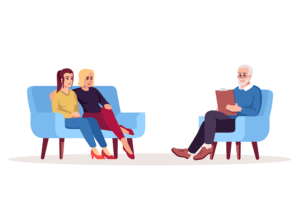Finding the right therapist can be a daunting task, especially for members of the LGBTQ+ community. Many people in the community face stigma, discrimination, and prejudice, which can impact their mental health. They need to find a therapist who is understanding and accepting of their identity and can provide them with the support they need. This is where an LGBTQ+-friendly therapist comes in. This blog cover all about LGBTQ+-friendly therapist.
Contents
Who is an LGBTQ -friendly therapist?

An LGBTQ+-friendly therapist is a mental health professional who is trained and experienced in working with individuals who identify as lesbian, gay, bisexual, transgender, queer, or questioning. These therapists understand the unique challenges and experiences that members of the LGBTQ+ community face and are sensitive to their needs.
An LGBTQ+-friendly therapist provides a safe and supportive space for clients to explore their feelings, thoughts, and behaviors. They use an affirming and non-judgmental approach that acknowledges the diversity within the LGBTQ+ community. They also help clients to develop coping strategies and skills to manage stress and improve their mental health.
Importance of Visiting LGBTQ-Friendly Therapists
- Understanding: LGBTQ -friendly therapists have specialized training and experience working with members of the LGBTQ+ community. They understand the unique challenges and experiences that individuals may face related to their sexual orientation or gender identity and can provide a supportive and affirming space for clients to explore their mental health concerns.
- Affirmation: An LGBTQ -friendly therapist uses an affirming and non-judgmental approach that acknowledges the diversity within the community. They validate their clients’ experiences and help them to feel seen and heard. This is especially important for individuals who may face stigma, discrimination, or rejection from family, friends, or society at large.
- Safety: An LGBTQ -friendly therapist provides a safe and supportive space for clients to explore their feelings, thoughts, and behaviors. They create an environment where clients can be themselves without fear of judgment or discrimination. This is important because individuals who identify as LGBTQ+ may feel unsafe or uncomfortable seeking mental health support from therapists who are not knowledgeable or accepting of their identity.
- Knowledge: LGBTQ -friendly therapists are knowledgeable about the unique mental health needs of the community. They understand the impact of discrimination and prejudice on mental health and can provide appropriate support and treatment. This is especially important because individuals who identify as LGBTQ+ may be at higher risk for mental health concerns such as depression, anxiety, or substance abuse.
- Connection: An LGBTQ -friendly therapist can help clients connect with other members of the community. They can provide referrals to LGBTQ+ support groups, organizations, and resources that can provide additional support and community. This is important because a sense of belonging and connection can have a positive impact on mental health and well-being.
Techniques Used By LGBTQ-Friendly Therapists

- Affirmative Therapy: Affirmative therapy is an approach that validates and affirms the identities and experiences of LGBTQ+ individuals. This technique emphasizes the importance of creating a safe and supportive space for clients to explore their thoughts, feelings, and behaviors without fear of judgment or discrimination.
- Cognitive-Behavioral Therapy (CBT): CBT is a type of therapy that focuses on the connection between thoughts, feelings, and behaviors. It is often used to help individuals manage symptoms of anxiety, depression, or other mental health concerns. LGBTQ+-friendly therapists may use CBT to help clients identify negative thought patterns related to their sexual orientation or gender identity and develop coping strategies to manage them.
- Dialectical Behavior Therapy (DBT): DBT is a type of therapy that emphasizes mindfulness, emotion regulation, and interpersonal skills. It is often used to treat individuals with borderline personality disorder or other mental health concerns related to emotional dysregulation. LGBTQ+-friendly therapists may use DBT to help clients develop coping strategies for managing stress related to their identity or experiences of discrimination.
- Family Therapy: Family therapy is a type of therapy that involves the whole family in the therapeutic process. It is often used to address conflicts or challenges within the family system. LGBTQ+-friendly therapists may use family therapy to address issues related to coming out or family rejection.
- Narrative Therapy: Narrative therapy is a type of therapy that focuses on the stories that individuals tell themselves about their experiences. It emphasizes the importance of creating new narratives that empower individuals and promote positive change. LGBTQ+-friendly therapists may use narrative therapy to help clients create new narratives around their identities and experiences that promote self-acceptance and self-compassion.
- Mindfulness-Based Stress Reduction (MBSR): MBSR is a type of therapy that uses mindfulness meditation to help individuals manage stress and improve their mental health. LGBTQ+-friendly therapists may use MBSR to help clients develop a greater sense of self-awareness and self-compassion related to their identity or experiences of discrimination.
Factors To Keep In Mind Before Visiting

- Location: Consider the location of the therapist’s office and whether it is easily accessible to you. If you live in an area where there are few or no LGBTQ+-friendly therapists, consider seeking support from an online therapist who specializes in working with the community.
- Insurance: Check with your insurance provider to see if they cover mental health services with an LGBTQ+-friendly therapist. If not, you may need to pay out-of-pocket or seek support from a therapist who offers sliding-scale fees.
- Compatibility: It’s important to find a therapist who is a good fit for you. Consider scheduling a consultation with the therapist to see if you feel comfortable and safe with them. You should feel like you can trust and confide in your therapist.
- Training and Experience: Look for a therapist who has specialized training and experience working with members of the LGBTQ+ community. They should be knowledgeable about the unique mental health needs of the community and be able to provide appropriate support and treatment.
- Referrals: Ask friends, family members, or other members of the LGBTQ+ community for referrals to an LGBTQ+-friendly therapist. You can also check online directories or contact LGBTQ+ organizations in your area for recommendations.
- Confidentiality: It’s important to find a therapist who will maintain confidentiality and protect your privacy. Ask about their confidentiality policies and procedures to ensure that your information is kept safe and secure.
How To Find LGBTQ-Friendly Therapists?
- Ask for Referrals: Ask friends, family members, or other members of the LGBTQ+ community for referrals. They may be able to recommend a therapist who they have had a positive experience with.
- Use Online Directories: There are online directories that list LGBTQ+-friendly therapists in your area. Some of these directories include Mantracare, Therapy for Queer People, and the Gay and Lesbian Medical Association’s provider directory.
- Contact LGBTQ+ Organizations: LGBTQ+ organizations in your area may be able to provide referrals to LGBTQ+-friendly therapists. They may also have a list of recommended therapists on their website.
- Check with Insurance Providers: Check with your insurance provider to see if they cover mental health services with an LGBTQ+-friendly therapist. If not, you may need to pay out-of-pocket or seek support from a therapist who offers sliding-scale fees.
- Interview Potential Therapists: Once you have a list of potential therapists, schedule a consultation to interview them. Ask about their experience working with members of the LGBTQ+ community and their approach to therapy. You should feel comfortable and safe with your therapist. So trust your instincts and choose a therapist who you feel is a good fit for you.
- Attend LGBTQ+ Events: Attend LGBTQ+ events, such as Pride parades or community meetings, and connect with other members of the community. You may be able to find a therapist through word-of-mouth referrals or recommendations from other members of the community.
Limitations of Visiting LGBTQ+ Friendly Therapists

- Availability: Depending on your location, it may be challenging to find an LGBTQ+-friendly therapist. There may be a limited number of therapists who specialize in working with the community, which could result in longer wait times or limited availability.
- Cost: Some LGBTQ+-friendly therapists may charge higher fees or may not accept insurance. This could make it challenging for individuals who cannot afford to pay out of pocket for therapy.
- Compatibility: While it’s important to find a therapist who is a good fit for you, not every LGBTQ+-friendly therapist may be the right match. It may take some time to find a therapist who you feel comfortable and safe with. Also, he understands your unique experiences and challenges.
- Disclosure: Depending on your circumstances, disclosing your sexual orientation or gender identity to a therapist could be challenging or uncomfortable. It’s important to find a therapist who is respectful of your privacy and who you feel comfortable sharing with.
- Family Reactions: If you come from a family that is not accepting of your sexual orientation or gender identity, seeking support from an LGBTQ+-friendly therapist could be challenging. They may see it as a sign of “giving up” on the family or betraying their beliefs, which could lead to further rejection or conflict.
Conclusion
For more information, please contact MantraCare. Online therapists are increasingly important in today’s world because they provide a convenient and accessible way for people to receive mental health support and treatment. Visit MantraCare If you are searching for a “therapist near me” and Online LGBTQ Counseling. Book a trial Online therapy session


